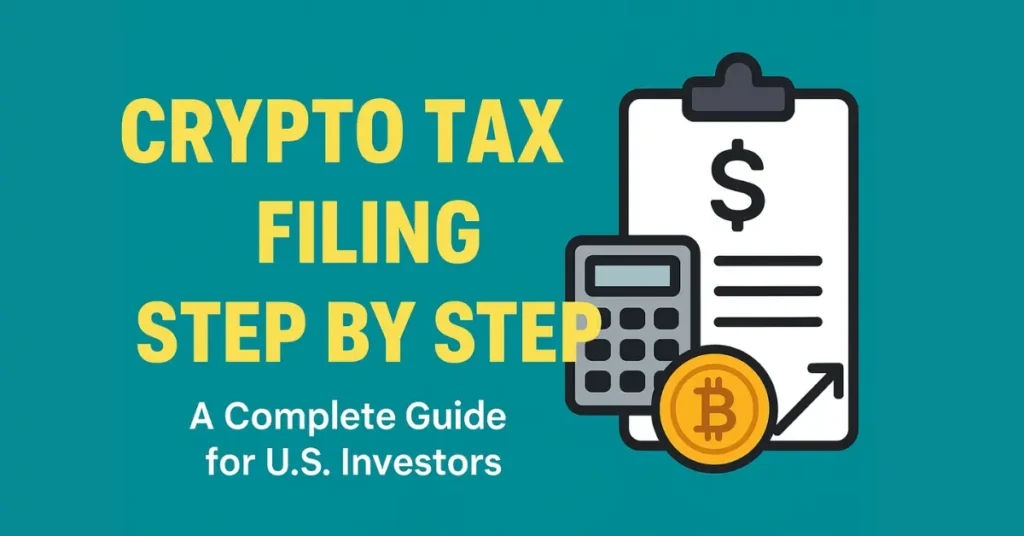Crypto tax filing step by step
Introduction to Crypto Taxes in the U.S.
Cryptocurrency has come a long way from being a niche internet experiment to becoming one of the most talked-about investment opportunities in the world. In the United States, millions of people now hold Bitcoin, Ethereum, and other digital assets, but here’s the catch—Uncle Sam wants his cut. The IRS (Internal Revenue Service) treats cryptocurrency as property, not currency. That means whenever you sell, trade, or even spend your crypto, it’s considered a taxable event.
This surprises many new investors who assume that crypto behaves like cash. In reality, every transaction could have tax consequences, whether it’s selling Bitcoin for dollars, swapping Ethereum for Solana, or even buying a cup of coffee with crypto. The IRS has made it clear: if you make money in crypto, you need to report it.
Unfortunately, many taxpayers still make mistakes—some don’t report their holdings at all, while others underreport because they don’t realize what counts as taxable. This has led the IRS to step up enforcement, sending warning letters and even auditing crypto users.
Filing crypto taxes might sound intimidating, but it doesn’t have to be. With the right knowledge and step-by-step guidance, you can stay compliant, minimize your tax liability, and avoid trouble with the IRS. This guide is designed to break everything down in plain English, making crypto taxes less of a headache.
Understanding How Cryptocurrency is Taxed
Before jumping into the filing process, you need to understand how crypto taxation works in the U.S. Unlike regular money, crypto is seen by the IRS as an investment asset—similar to stocks or real estate. That means most crypto transactions fall into one of two categories: capital gains tax or income tax.
Capital Gains Tax
When you sell, trade, or spend crypto, you trigger a capital gains event. The difference between what you paid for it (your cost basis) and what you sold it for determines whether you have a gain or a loss.
Short-term capital gains apply when you hold crypto for less than a year before selling. These gains are taxed at your ordinary income tax rate (which could be as high as 37%).
Long-term capital gains apply when you hold for more than a year before selling. These are taxed at a reduced rate, typically 0%, 15%, or 20%, depending on your income bracket.
Income Tax
Some crypto activities are treated as ordinary income rather than capital gains. This includes:
- Mining rewards
- Staking rewards
- Airdrops
Payments received in crypto
In these cases, the fair market value of the crypto on the day you received it is counted as income. Later, if you sell it, you’ll face capital gains tax again based on any change in value.
Non-Taxable Events
Not everything is taxable. For example:
- Buying and holding crypto without selling
- Transferring crypto between your own wallets
Donating crypto to a qualified charity (in some cases, this may even give you a deduction)
Understanding which activities are taxable and which aren’t is the foundation of crypto tax compliance.
Step 1 – Gather All Your Crypto Transaction Records
The very first step in filing crypto taxes is collecting all your transaction history. Unlike traditional investments where you get a neat 1099 form from your broker, crypto can be spread across dozens of wallets, exchanges, and DeFi platforms.
You’ll need records of:
- Purchases
- Sales
- Trades (crypto-to-crypto)
- Transfers between wallets
Income events (mining, staking, airdrops, payments)
This information should include the date, amount, fair market value in USD, fees, and wallet addresses involved. The IRS expects accuracy, so you’ll want to be meticulous.
Challenges of Record-Keeping
- Some exchanges don’t provide complete transaction histories.
- If you use decentralized exchanges (DEXs), you’re responsible for tracking trades yourself.
- Moving crypto between wallets can complicate tracking cost basis.
Solutions
Instead of doing this manually, many investors use crypto tax software such as CoinTracker, Koinly, or TokenTax. These tools automatically import transactions from exchanges and wallets, calculate gains and losses, and generate tax reports compatible with TurboTax or directly with the IRS forms.
The earlier you start organizing your records, the smoother tax season will be.
Step 2 – Identify Your Taxable Events
Now that you’ve gathered your records, the next step is to figure out which transactions are taxable. Remember, simply holding crypto in a wallet isn’t taxable. What matters are events that change your financial position.
Taxable Events Include:
Selling crypto for fiat currency (USD, EUR, etc.)
- Example: Selling Bitcoin for $40,000 after buying at $30,000 results in a $10,000 gain.
Trading one crypto for another
- Example: Swapping Ethereum for Solana triggers a taxable event, even if you never cash out to dollars.
Using crypto to buy goods or services
- Buying a laptop with Bitcoin counts as selling crypto.
Receiving crypto as payment, mining, or staking rewards
- The fair market value of the crypto at the time you receive it is taxable income.
Non-Taxable Events Include:
- Holding crypto without selling
- Transferring between your own wallets
- Gifting crypto under the annual exclusion amount ($17,000 per recipient in 2023)
By clearly separating taxable from non-taxable events, you’ll avoid unnecessary overreporting while still staying compliant.
Step 3 – Calculate Your Gains and Losses
Once you know which events are taxable, it’s time to calculate gains and losses. This is where many people start to feel overwhelmed, but breaking it down step by step makes it manageable.
Cost Basis
Your cost basis is the original amount you paid for the crypto, including fees. If you bought 1 BTC at $20,000 plus a $200 fee, your cost basis is $20,200.
Calculating Gains/Losses
- If you sell that BTC for $30,000, your gain is $9,800.
- If you sell it for $15,000, you have a loss of $5,200, which you can use to offset other gains.
Accounting Methods
The IRS allows different methods to calculate which coins you sold:
- FIFO (First In, First Out): The oldest coins you bought are sold first.
- LIFO (Last In, First Out): The newest coins are sold first.
- HIFO (Highest In, First Out): The most expensive coins are sold first, potentially minimizing gains.
You must be consistent in whichever method you choose.
Using Software
Because crypto transactions can be numerous and spread across platforms, many taxpayers rely on tax software that automatically calculates gains, losses, and cost basis across all wallets and exchanges. This ensures accuracy and saves hours of manual work.
Getting this step right is crucial because it directly impacts how much tax you’ll owe—or how much of a refund you might get.
Step 4 – Report Crypto Income on Your Tax Return
Once you’ve calculated your crypto gains, losses, and income, the next step is actually reporting them on your IRS tax forms. This is the stage where many people make mistakes, either because they don’t know which form to use or they accidentally leave out part of their crypto activity.
IRS Forms for Crypto Taxes
Here are the main forms you’ll need when filing:
Form 8949
- This is where you report all your capital gains and losses from selling or trading crypto.
- Each transaction must include the date acquired, date sold, cost basis, proceeds, and resulting gain or loss.
Schedule D (Form 1040)
- This summarizes the total gains and losses reported on Form 8949.
Schedule 1 (Form 1040)
- This is where you report crypto income from activities such as mining, staking, and airdrops.
Schedule C (Form 1040)
- If you earn crypto from running a business or as self-employment income, report it here. You can also deduct expenses related to mining or business activities.
Reporting Different Types of Crypto Activity
- Mining Rewards → Taxed as ordinary income on Schedule 1 or Schedule C.
- Staking Rewards → Taxed as ordinary income at the time you receive them.
- Airdrops → Taxable at the fair market value on the date received.
- NFTs → If sold for profit, report them as capital gains. If created and sold, report as income.
DeFi and Complex Transactions
DeFi (Decentralized Finance) adds another layer of complexity. Lending, yield farming, and liquidity pools may involve multiple taxable events. For example, earning interest in a DeFi protocol counts as income, while swapping tokens triggers capital gains tax.
The IRS has not issued clear guidance on every DeFi activity yet, but the safest approach is to report them in line with existing capital gains and income tax rules.
The bottom line: everything must be reported. Even if you think the IRS won’t notice a small trade or a $50 staking reward, keep in mind that exchanges are increasingly sending tax forms (1099-B, 1099-MISC), and blockchain analytics firms help the IRS track transactions. Transparency is always the safest approach.
Step 5 – File Your Taxes Accurately and On Time
Now that your forms are ready, it’s time to file your taxes. Filing correctly and on time is critical to avoiding penalties, interest charges, and IRS audits.
Deadlines and Extensions
- The standard deadline for filing U.S. taxes is April 15 each year.
- If you can’t file by then, you can request an extension using Form 4868, which typically gives you until October 15.
- Remember: An extension gives you more time to file, but not more time to pay. If you owe taxes, you still need to estimate and pay by April 15.
Common Filing Mistakes to Avoid
- Not Reporting All Transactions – Even if you lost money, you must report it. Losses can actually reduce your taxable income.
- Double Counting – Some people accidentally import the same wallet or exchange twice into tax software, which inflates their gains.
- Ignoring Fees – Exchange and network fees reduce your cost basis and should be included in calculations.
- Using Inconsistent Accounting Methods – Switching between FIFO, LIFO, and HIFO without documentation can raise red flags.
Should You Hire a Professional?
If you have only a few transactions, software might be enough. But if you’re involved in DeFi, NFTs, or have hundreds of trades across multiple platforms, it may be wise to hire a CPA (Certified Public Accountant) who specializes in crypto. They can ensure compliance and help with tax-saving strategies.
Filing taxes is stressful enough. Adding crypto into the mix can feel overwhelming, but with the right approach—and possibly professional help—you can file with confidence and avoid the IRS headache.
Tools and Software to Simplify Crypto Tax Filing
Manually tracking every single transaction can feel like a full-time job. That’s why most crypto investors rely on tax software to save time, reduce errors, and ensure IRS compliance.
Best Crypto Tax Software in the U.S.
- CoinTracker – Integrates with Coinbase, Binance, and over 300 wallets and exchanges. Generates IRS-ready reports.
- Koinly – Supports DeFi, staking, NFTs, and imports from hundreds of exchanges. Offers both free and paid versions.
- TokenTax – Known for advanced features and direct CPA support. Great for heavy traders.
- ZenLedger – Offers TurboTax integration and DeFi/NFT support. Good for beginners and professionals alike.
Manual vs. Automated Filing
- Manual Filing: Works if you have only a handful of transactions. However, it’s prone to errors and time-consuming.
- Automated Filing: Ideal for investors with multiple wallets, trades, and income sources. Saves hours and ensures accuracy.
Integration with TurboTax and Other Platforms
Many crypto tax tools integrate directly with TurboTax, H&R Block, or allow you to download IRS-ready forms (Form 8949, Schedule D). This makes filing much smoother.
Pro Tip: Even if you use software, always cross-check your results. No software is perfect, and it’s your responsibility to ensure the information is accurate before submitting it to the IRS.
Strategies to Legally Minimize Your Crypto Taxes
No one enjoys paying more taxes than necessary. The good news is that there are legal ways to reduce your tax burden when it comes to crypto.
Tax-Loss Harvesting
- If your crypto investments are down, you can sell at a loss to offset other gains.
- Example: You made $10,000 profit from Bitcoin but lost $4,000 in Ethereum. Reporting the loss reduces your taxable gain to $6,000.
Holding Period Strategy
- Holding crypto for more than a year before selling reduces your tax rate from short-term (ordinary income) to long-term capital gains (0–20%).
- Patience can save you thousands in taxes.
Use Retirement Accounts
- Investing in crypto through self-directed IRAs or 401(k)s can defer or even eliminate taxes. Gains grow tax-free until withdrawal.
Gifting and Charitable Donations
- You can gift up to $17,000 (2023 limit) per year per recipient without triggering gift tax.
- Donating crypto to a qualified charity may allow you to deduct the full fair market value while avoiding capital gains tax.
These strategies require planning and good record-keeping, but they can significantly reduce your tax liability. A crypto-savvy CPA can help optimize these approaches for your unique situation.
Special Cases in Crypto Taxation
Cryptocurrency taxation isn’t always straightforward. While buying, selling, and trading are common scenarios, some special cases like NFTs, DeFi, and international transactions complicate things further. Understanding these unique situations can save you from making costly mistakes.
NFTs (Non-Fungible Tokens)
NFTs are treated differently from regular crypto because they are often considered collectibles. Under IRS rules, collectibles can be taxed at a higher maximum rate (28%) instead of the usual 20% long-term capital gains rate.
- Buying and Selling NFTs: If you buy an NFT for $1,000 and sell it for $3,000, you owe capital gains tax on the $2,000 profit.
- Creating NFTs: If you create and sell NFTs, the income is treated as ordinary income, not capital gains.
DeFi (Decentralized Finance)
DeFi transactions are among the trickiest for tax purposes. Examples include lending, borrowing, staking, liquidity pools, and yield farming. Each may trigger different tax events:
- Lending crypto and earning interest → taxable income.
- Staking in a liquidity pool → may be considered a swap, creating a taxable event.
- Receiving governance tokens as rewards → taxable as ordinary income.
Because IRS guidance is limited, the safest approach is to treat every gain, swap, or reward as taxable unless future regulations clarify otherwise.
Cross-Border Transactions
If you use a non-U.S. exchange or wallet, the IRS still requires reporting. In some cases, you may also need to file FBAR (Foreign Bank Account Report) if your foreign-held crypto exceeds certain thresholds.
Lost or Stolen Crypto
Unfortunately, you cannot currently claim lost or stolen crypto as a tax deduction due to changes in tax law (post-2017). However, you may be able to claim a capital loss if you sold or abandoned worthless assets.
Navigating these special cases requires caution. If you’re heavily involved in NFTs or DeFi, consider working with a professional tax advisor who keeps up with the latest IRS updates.
Common Pitfalls and IRS Red Flags
The IRS is paying close attention to crypto taxpayers, and certain mistakes can trigger audits or penalties. Avoiding these common pitfalls will help you stay safe.
Not Reporting Small Transactions
Many people assume that small trades, like buying coffee with Bitcoin, don’t matter. But technically, every transaction must be reported. Failing to do so creates discrepancies between your tax return and exchange-reported data.
Mixing Personal and Business Wallets
If you run a business that accepts crypto, keep it separate from your personal holdings. Mixing funds makes it harder to prove which transactions are business-related and which are personal investments.
Ignoring Exchange Tax Forms
Exchanges like Coinbase often issue Form 1099-MISC or 1099-B to both you and the IRS. If you fail to report transactions that the IRS already sees, you’ll raise red flags.
Double Reporting Transactions
Using multiple crypto tax tools or importing the same wallet twice can inflate your income. This is a common error and can result in overpaying taxes—or worse, an IRS inquiry.
Overlooking Airdrops and Forks
Hard forks and airdrops are taxable as income when received. Many investors forget to report these, which can be a red flag during an audit.
The bottom line: the IRS is watching. It uses blockchain analysis tools and collaborates with exchanges, so it’s better to be transparent and accurate than risk penalties later.
IRS Audits and Penalties for Non-Compliance
If you underreport or fail to report your crypto transactions, the IRS has multiple ways to enforce compliance. The consequences can be serious.
How the IRS Tracks Crypto
- Exchange Reports: Many U.S. exchanges now send transaction data directly to the IRS.
- Blockchain Analytics: The IRS partners with firms like Chainalysis to trace blockchain transactions.
- Crypto Question on Form 1040: Every taxpayer must now answer the yes/no question about whether they engaged in crypto transactions.
Penalties for Underreporting
- Failure-to-file penalty: 5% of unpaid taxes per month (up to 25%).
- Failure-to-pay penalty: 0.5% per month on unpaid balances.
- Accuracy-related penalty: 20% of underreported tax.
Criminal charges: In severe cases, intentional tax evasion can result in fines or even prison.
What to Do if Audited
- Stay calm and be prepared.
- Provide detailed transaction records.
- Use tax software reports as evidence.
If needed, hire a CPA or tax attorney who specializes in crypto.
The best way to avoid penalties is simple: file accurately, keep records, and report everything—even if you think it’s minor.
Future of Crypto Taxes in the U.S.
The crypto tax landscape is evolving quickly. What applies today may change within a year, so staying updated is crucial.
Recent IRS Updates
- Exchanges are required to issue more detailed 1099-B forms starting in 2024, making it harder for taxpayers to underreport.
- The IRS clarified that digital assets include NFTs and stablecoins, expanding the scope of taxable crypto.
Possible Regulatory Changes
- Stricter reporting requirements for DeFi and decentralized exchanges.
- Potential new tax brackets or rules specifically for digital assets.
- Clarifications on staking, yield farming, and NFTs.
Blockchain Analytics Expansion
The IRS will likely continue using blockchain tracing tools to monitor compliance. As regulations tighten, taxpayers should expect less “grey area” and more clarity—but also more enforcement.
The future is clear: crypto will remain taxable, and compliance will only become stricter. Being proactive now will save you trouble later.
Expert Tips for Stress-Free Crypto Tax Filing
Filing crypto taxes doesn’t have to feel like navigating a minefield. With some planning and organization, you can make the process smoother.
Keep Detailed Records Year-Round
Don’t wait until April to scramble for data. Use software or spreadsheets to track transactions monthly.
Automate with Reliable Software
The best way to avoid mistakes is to let technology handle the heavy lifting. Import data from all wallets and exchanges regularly.
Stay Updated on IRS Announcements
Tax rules around crypto change often. Bookmark the IRS digital assets page and follow updates to avoid surprises.
Work with a Crypto-Savvy CPA
Not all accountants understand crypto. Find a professional who has direct experience with DeFi, NFTs, and staking if you’re involved in those areas.
Plan Ahead for Tax Season
Set aside part of your profits throughout the year to cover taxes. Nothing is worse than realizing in April that you owe thousands with no funds set aside.
With the right habits, crypto tax filing can shift from a yearly nightmare to just another financial routine.
Conclusion
Filing crypto taxes in the U.S. may seem overwhelming at first, but with the right strategy, it becomes much more manageable. The key is to approach it step by step—start by gathering your transaction records, then identify taxable events, calculate your gains and losses, and report them correctly on the IRS forms. Once you’ve done that, make sure you file on time and consider using reliable tax software or a crypto-savvy CPA if your situation is complex.
The IRS is paying closer attention than ever to cryptocurrency, which means compliance is no longer optional—it’s mandatory. But the good news is that staying compliant doesn’t just keep you out of trouble; it can also help you find opportunities to reduce your tax bill legally. By using strategies like tax-loss harvesting, holding long-term, or donating crypto to charity, you can save money while still following the rules.
The crypto world moves fast, and tax regulations are evolving just as quickly. What’s true today might change next year, so keeping up with IRS updates is essential. At the end of the day, crypto investing should be exciting, not stressful—and filing your taxes properly is a big part of ensuring you can enjoy your gains without worrying about penalties or audits.
If you treat tax filing as part of your overall investment strategy, rather than an afterthought, you’ll have peace of mind and more control over your financial future. Remember, being proactive is the best way to make tax season less painful and more rewarding.
FAQs
Do I have to pay taxes if I didn’t cash out my crypto?
Yes. Even if you didn’t convert your crypto to dollars, activities like trading one crypto for another or using it for purchases trigger taxable events. Only holding crypto without selling or using it is tax-free.
What happens if I forgot to report my crypto transactions?
If you left out transactions, you should file an amended return as soon as possible. Ignoring it could lead to IRS penalties, interest, or even an audit.
Are crypto-to-crypto trades taxable in the U.S.?
Yes. Swapping Bitcoin for Ethereum, or any other crypto pair, counts as selling one asset and buying another. You must report the gain or loss on the transaction.
Can I deduct fees from exchanges and wallets?
Absolutely. Transaction fees, exchange fees, and network (gas) fees can be added to your cost basis or deducted from your proceeds, lowering your taxable income.
Do I need to report crypto held in foreign exchanges?
Yes. All crypto holdings must be reported, whether on U.S. or foreign exchanges. If the value of your foreign accounts exceeds certain thresholds, you may also have to file an FBAR (Foreign Bank Account Report).
Also, read
- What is a crypto wallet, and how does it work? – Coinsify
- 10 Crypto Terms Every Beginner Must Know: Coinsify
- What is blockchain technology? Complete Guide – Coinsify
- How to Buy Crypto Safely in 2025: Complete Guide – Coinsify
- Bitcoin vs Ethereum: Key Differences Explained: Complete Guide
- Ultimate Blockchain Glossary: Learn Blockchain Terms Easily
- How to Buy Bitcoin Safely (Complete Beginner’s Guide)
- Top 10 Crypto Wallets for Beginners (2025 Edition)
- What is cryptocurrency? A Beginner-Friendly Guide (2025)






